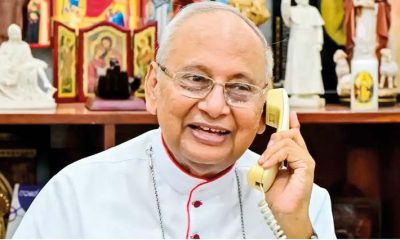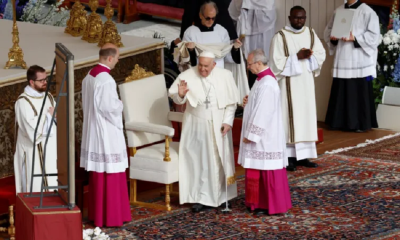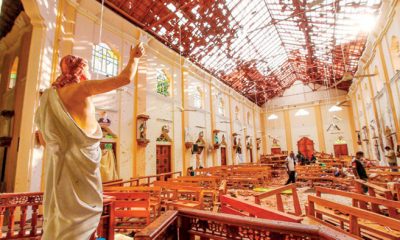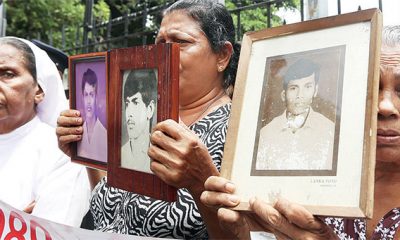Features
Why no truth commission for Easter bombing?

by Jehan Perera
Three Easters have passed since the fateful Easter in 2019 which plunged the entire country into shock and terror of a kind not seen even during the three-decade long war. The synchronised attack by a team of 10 suicide bombers took the lives of 272 persons and injured another 500 or more in a total of six simultaneous attacks- on three churches and three luxury hotels. These included entire families, parents with their children and also foreigners who had come to enjoy the warmth of Sri Lanka. The country virtually shut down for two months during which time people were living on rumours and afraid to venture into crowded areas. There was no logic in the attack in which one minority religious group targeted another minority religious group with whom there had been no prior local history of conflict. The Easter bombing undid all the reconciliation work that had been done since the war ended a decade earlier.
Amidst the chaos and speculations in the aftermath of the bombings, it was noted that some opposition politicians had not shown the same fear that gripped the rest of the country. Former President Mahinda Rajapaksa, then in the opposition, was one of the first at the scene of carnage. Former President Gotabaya Rajapaksa, then an aspiring candidate for the presidency, immediately put himself forward as the most suitable candidate to contest from the opposition. He promised to restore national security in the same way he had done by eliminating the LTTE a decade earlier and evoked a responsive chord in the terror-struck people who voted him to be president by a large majority.
The investigations by governments under three successive presidents, however, have not disclosed the truth of who was behind the attacks. The best that has been done so far, has been by the Supreme Court. This followed a Fundamental Rights case was filed by the Catholic Church and other citizens as no proper investigations were initiated by the government to provide legal redress. Having perused the investigation reports, it found former President Maithripala Sirisena and four senior security officials guilty of negligence in having failed to act on intelligence information that they had received. They all were subjected to fines, running into millions of rupees which the officials in particular would be hard pressed to pay. But the court did not identify who was the mastermind behind the bombings. So the search for the truth must continue.
In a recent media interview Cardinal Malcolm Ranjith stated that the government investigations so far had been unsatisfactory and unacceptable. He said “The official channels of justice have not been fair to us all along. There has never been a serious, committed investigation into the Easter attack, its causes, its players and authors and any other forces…” He warned that a similar application would also be filed in the future in the courts against the current president once he leaves office as he currently enjoys immunity. He pointed out that the president would not hold that position for all time but the Catholic Church would continue and those who came after him would also take up the cause.
TRUTH COMMISSION
In the absence of truth, there is no closure and suspicions only grow deeper. In his most recent statements Cardinal Malcolm Ranjith has got more and more outspoken. The Cardinal said during Easter Midnight Mass in Colombo, “Now the Easter Attacks. How many years? Four years. Still no justice. Still, no one knows what happened. All kinds of things are being said by people. It is important that we struggle for justice; for truth. That is Christianity.” In addition to demonstrating the unwavering resolve of the church to obtain justice, this was a clear example of how the Prevention of Terrorism Act that that was in place since 1979 failed to prevent the Easter bombing despite its draconian provisions that have led to a very large number of abuses. It is tragic that the present government seems to have lost sight of this lesson and is now proposing a worse alternative in the form of the draft Anti-Terrorism Act.
The government’s announcement that it will be setting up a truth commission to look into what happened in the three decade long civil war and bring about national reconciliation, will not deal with the Easter bombing. Insteasd, the truth commission will be looking at “Conflict means the conflict that took place on or after July 24, 1983, and prior to May 18, 2009. Though not elaborated upon, this is the period of the separatist insurgency by the Liberation Tigers of Tamil Eelam (LTTE) and other armed separatist groups who waged a guerrilla war. The mandate of the Commission will be, among others, the promotion of national unity, peace, rule of law, co-existence, equality with tolerance and respect for diversity, and reconciliation among the people of Sri Lanka, by establishing a truthful, accurate, impartial, complete record of the alleged damage and/or harm caused to persons or property (in the conflict)” https://www.sundaytimes.lk/230409/columns/government-gives-priority-to-national-unity-and-reconciliation-516742.html
The period of investigation being limited to July 24, 1983 to May 18, 2009 is an indication that the truth commission’s mandate will be a limited one. It will only look at that time period in which the LTTE was the dominant Tamil militant organisation. However, massive human rights violations continued to take place after the war’s end. Busloads of LTTE personnel and their families disappeared days after the war. Over 300,000 civilians were incarcerated in barbed wired camps for over six months in which many of them went missing, some who bribed themselves out and others who were taken away by the security forces. The ethnic conflict preceded the start date and continues after the end date making the mandate of the truth commission an inadequate one.
The specificity of the dates also raises a question whether only the ethnic war will be looked at by the truth commission or whether the JVP insurrection, which took place during that time frame (between 1987 and 1989) will also be investigated. A very large number of people lost their lives in that conflict which was separate from that of the ethnic conflict. The doubt arises because the formulation of the terms of reference of the truth commission has not been a public process and very much a secret one, quite unlike what happened in South Africa, which is the country that the government is seeking assistance from. In the coming days, the government may indicate what its intentions are, now that it seems to have decided to go ahead with the process.
PRESIDENT’S PLEDGE
It is clear the Easter bombing and its fallout will not be part of the mandate of the proposed truth commission. The mandate of the truth commission will only extend up to May 18, 2009, the last day of the war. The exclusion of the Easter bombing from the mandate of the truth commission may be justified on the basis that it took place a decade after the war had ended. It was also only a single event, unlike the war which continued over a very long period. But the need for a truth commission to investigate the Easter bombing cannot be ignored as the truth of what happened continues to be veiled and hidden. The puzzle then, and which remains to this day, was the motivation for the attacks and who was behind them.
Cardinal Malcolm Ranjith’s determination to ensure that the truth be found may have its origins in the belief that the Christian worshipers were made scapegoats for a deviant political agenda. The dead have no voice to demand justice, so it is the duty of the living to seek the truth. This is one of the reasons for the importance given worldwide to truth commissions to investigate controversial events of the past. Instead of working together for accountability and justice, government leaders so far have shown little or no interest in ensuring accountability of those who were responsible for the Easter attack taking place. Unfortunately, it is no different in relation to the present economic crisis. There seem to be no action to explore the making of the crisis and the failure of the government to address the issue of accountability for those who wrecked the economy and continue to be in the seats of power.
In his Easter message, President Ranil Wickremesinghe appeared to be aware and sensitive to Malcolm Cardinal Ranjith’s sentiments which he sought to assuage when he said “I am very much aware of the extreme pain caused by the Easter Sunday attack being still fresh in your minds, and I share that pain. I wish to reassure you that the legal proceedings related to this tragic incident are being processed independently and impartially, without any influence. The necessary groundwork towards this end has been laid, to ensure justice for all the victims. I pledge my unwavering commitment to ensuring the security of our country, by preventing any recurrence of such heinous acts.” In addition to restating his commitment, the president can strengthen his credibility by also going back to the past to ensure that those who committed crimes, whether criminal or financial, are soon removed from positions of high office they do not merit.
Features
Kashmir terror attack underscores need for South Asian stability and amity

 The most urgent need for the South Asian region right now, in the wake of the cold-blooded killing by gunmen of nearly 30 local tourists in Indian-administered Kashmir two days back, is the initiation of measures that could ensure regional stability and peace. The state actors that matter most in this situation are India and Pakistan and it would be in the best interests of the region for both countries to stringently refrain from succumbing to knee-jerk reactions in the face of any perceived provocations arising from the bloodshed.
The most urgent need for the South Asian region right now, in the wake of the cold-blooded killing by gunmen of nearly 30 local tourists in Indian-administered Kashmir two days back, is the initiation of measures that could ensure regional stability and peace. The state actors that matter most in this situation are India and Pakistan and it would be in the best interests of the region for both countries to stringently refrain from succumbing to knee-jerk reactions in the face of any perceived provocations arising from the bloodshed.
The consequences for the countries concerned and the region could be grave if the terror incident leads to stepped-up friction and hostility between India and Pakistan. Some hardline elements in India, for instance, are on record in the international media as calling on the Indian state to initiate tough military action against Pakistan for the Kashmiri terror in question and a positive response to such urgings could even lead to a new India-Pakistan war.
Those wishing South Asia well are likely to advocate maximum restraint by both states and call for negotiations by them to avert any military stand-offs and conflicts that could prove counter-productive for all quarters concerned. This columnist lends his pen to such advocacy.
Right now in Sri Lanka, nationalistic elements in the country’s South in particular are splitting hairs over an MoU relating to security cooperation Sri Lanka has signed with India. Essentially, the main line of speculation among these sections is that Sri Lanka is coming under the suzerainty of India, so to speak, in the security sphere and would be under its dictates in the handling of its security interests. In the process, these nationalistic sections are giving fresh life to the deep-seated anti-India phobia among sections of the Sri Lankan public. The eventual result will be heightened, irrational hostility towards India among vulnerable, unenlightened Sri Lankans.
Nothing new will be said if the point is made that such irrational fears with respect to India are particularly marked among India’s smaller neighbouring states and their publics. Needless to say, collective fears of this kind only lead to perpetually strained relations between India and her neighbours, resulting in regional disunity, which, of course would not be in South Asia’s best interests.
SAARC is seen as ‘dead’ by some sections in South Asia and its present dysfunctional nature seems to give credence to this belief. Continued friction between India and Pakistan is seen as playing a major role in such inner paralysis and this is, no doubt, the main causative factor in SARRC’s current seeming ineffectiveness.
However, the widespread anti-India phobia referred to needs to be factored in as playing a role in SAARC’s lack of dynamism and ‘life’ as well. If democratic governments go some distance in exorcising such anti-Indianism from their people’s psyches, some progress could be made in restoring SAARC to ‘life’ and the latter could then play a constructive role in defusing India-Pakistan tensions.
It does not follow that if SAARC was ‘alive and well’, security related incidents of the kind that were witnessed in India-administered Kashmir recently would not occur. This is far from being the case, but if SAARC was fully operational, the states concerned would be in possession of the means and channels of resolving the issues that flow from such crises with greater amicability and mutual accommodation.
Accordingly, the South Asian Eight would be acting in their interests by seeking to restore SAARC back to ‘life’. An essential task in this process is the elimination of mutual fear and suspicion among the Eight and the states concerned need to do all that they could to eliminate any fixations and phobias that the countries have in relation to each other.
It does not follow from the foregoing that the SAARC Eight should not broad base their relations and pull back from fostering beneficial ties with extra-regional countries and groupings that have a bearing on their best interests. On the contrary, each SAARC country’s ties need to be wide-ranging and based on the principle that each such state would be a friend to all countries and an enemy of none as long as the latter are well-meaning.
The foregoing sharp focus on SAARC and its fortunes is necessitated by the consideration that the developmental issues in particular facing the region are best resolved by the region itself on the basis of its multiple material and intellectual resources. The grouping should not only be revived but a revisit should also be made to its past programs; particularly those which related to intra-regional conflict resolution. Thus, talking to each other under a new visionary commitment to SAARC collective wellbeing is crucially needed.
On the question of ties with India, it should be perceived by the latter’s smaller neighbours that there is no getting away from the need to foster increasingly closer relations with India, today a number one global power.
This should not amount to these smaller neighbours surrendering their rights and sovereignty to India. Far from it. On the contrary these smaller states should seek to craft mutually beneficial ties with India. It is a question of these small states following a truly Non-aligned foreign policy and using their best diplomatic and political skills to structure their ties with India in a way that would be mutually beneficial. It is up to these neighbours to cultivate the skills needed to meet these major challenges.
Going ahead, it will be in South Asia’s best interests to get SAARC back on its feet once again. If this aim is pursued with visionary zeal and if SAARC amity is sealed once and for all intra-regional friction and enmities could be put to rest. What smaller states should avoid scrupulously is the pitting of extra-regional powers against India and Pakistan in their squabbles with either of the latter. This practice has been pivotal in bringing strife and contention into South Asia and in dividing the region against itself.
Accordingly, the principal challenge facing South Asia is to be imbued once again with the SAARC spirit. The latter spirit’s healing powers need to be made real and enduring. Thus will we have a region truly united in brotherhood and peace.
Features
International schools …in action

 The British School in Colombo celebrated the 2025 Sinhala and Tamil New Year with the traditional rites and rituals and customs unique to the island nation, during a special Avurudu Assembly held at the school premises.
The British School in Colombo celebrated the 2025 Sinhala and Tamil New Year with the traditional rites and rituals and customs unique to the island nation, during a special Avurudu Assembly held at the school premises.
Students from all over the world, who are part of The British School in Colombo, gathered to celebrate this joyous event.
The special assembly featured traditional song and dance items from talented performers of both the Junior and Senior Schools.
On this particular day, the teachers and students were invited to attend school in Sri Lankan national costume and, among the traditional rituals celebrated, was the boiling of the milk and the tradition of Ganu-Denu.

Boiling of
the milk
In the meanwhile, a group of swimmers from Lyceum International School, Wattala, visited Australia to participate in the Global-ISE International Swimming Training Programme in Melbourne.
Over the course of 10 days, the swimmers followed an advanced training schedule and attended sessions at the Melbourne Sports and Aquatic Centre (MSAC), Victoria’s Nunawading Swimming Club, and Camberwell Grammar School.
In addition to their training, the group also explored Melbourne, with visits to key landmarks, such as the Parliament House and the Melbourne Cricket Ground (MCG), along with city tours and cultural experiences.

Traditional dance item

Tug-of-war contest

On arrival in Melbourne, Lyceum International School, Wattala, with Sri Lankan officials
Features
Perfect … and healthy

 Got a few more beauty tips to give you … for a perfect complexion, or, let’s say, a healthy skin.
Got a few more beauty tips to give you … for a perfect complexion, or, let’s say, a healthy skin.
* Honey Face Mask:
Take a tablespoon of raw honey and then warm it up by rubbing it with your fingertips. Apply the warm honey all over your face. Let this natural mask stand for about 10 minutes and then wash it off gently with warm water.
* Coconut Milk Face Mask:
You need to squeeze coconut milk out of a grated raw coconut and apply this milk all over your face, including your lips.
(This will help you gain a glowing skin. It is one of the best natural tips for skin care)
* Orange, Lemon, and Yoghurt Moisturiser:
To prepare this moisturiser, you need a tablespoon of orange juice, a tablespoon of lemon juice and a cup of plain yoghurt.
Mix them together and apply the paste all over your face, leaving it as a mask for 10 to 15 minutes. Next, take a damp handkerchief and use it to clean your face.
(This moisturiser brightens the complexion of your skin)
* Cucumber and Lemon:
Apply equal parts of cucumber and lemon juice on your face before taking a bath. Allow it to sit for 10 minutes before rinsing it off. This natural face beauty tip will brighten your skin tone and lighten blemishes if used on a regular basis. The best aspect is that it is appropriate for all skin types!
* Healthy Diet:
Aside from the effective home remedies, there are certain other factors to consider for skin care – and the first of them is your diet. Without the right nutrients, your skin cannot reverse the damage it suffers every day.
Eat fruits that are high in vitamin C because they contain antioxidants.
Adjust your diet to get the right amount of protein and unsaturated fats, as well as fresh green vegetables. All of this provides the right amount of nutrients so your skin can heal and improve itself naturally.
* Sun Protection and Care:
Another thing to keep in mind is not to step out of your home without sunscreen, especially with this awful heat we are experiencing at the moment. The hard rays of the sun can do you more damage than you could ever imagine.
By the way, you can prepare your own sunscreen lotion with glycerin, cucumber juice and rose water. You can also keep this lotion in the fridge.
-

 Business6 days ago
Business6 days agoDIMO pioneers major fleet expansion with Tata SIGNA Prime Movers for ILM
-

 News5 days ago
News5 days agoFamily discovers rare species thought to be extinct for over a century in home garden
-

 Features7 days ago
Features7 days agoProf. Lal Tennekoon: An illustrious but utterly unpretentious and much -loved academic
-

 Foreign News5 days ago
Foreign News5 days agoChina races robots against humans in Beijing half marathon
-

 Features3 days ago
Features3 days agoRuGoesWild: Taking science into the wild — and into the hearts of Sri Lankans
-

 Editorial6 days ago
Editorial6 days agoSelective use of PTA
-

 News2 days ago
News2 days agoOrders under the provisions of the Prevention of Corruptions Act No. 9 of 2023 for concurrence of parliament
-

 Features5 days ago
Features5 days agoThe ironies of history
























